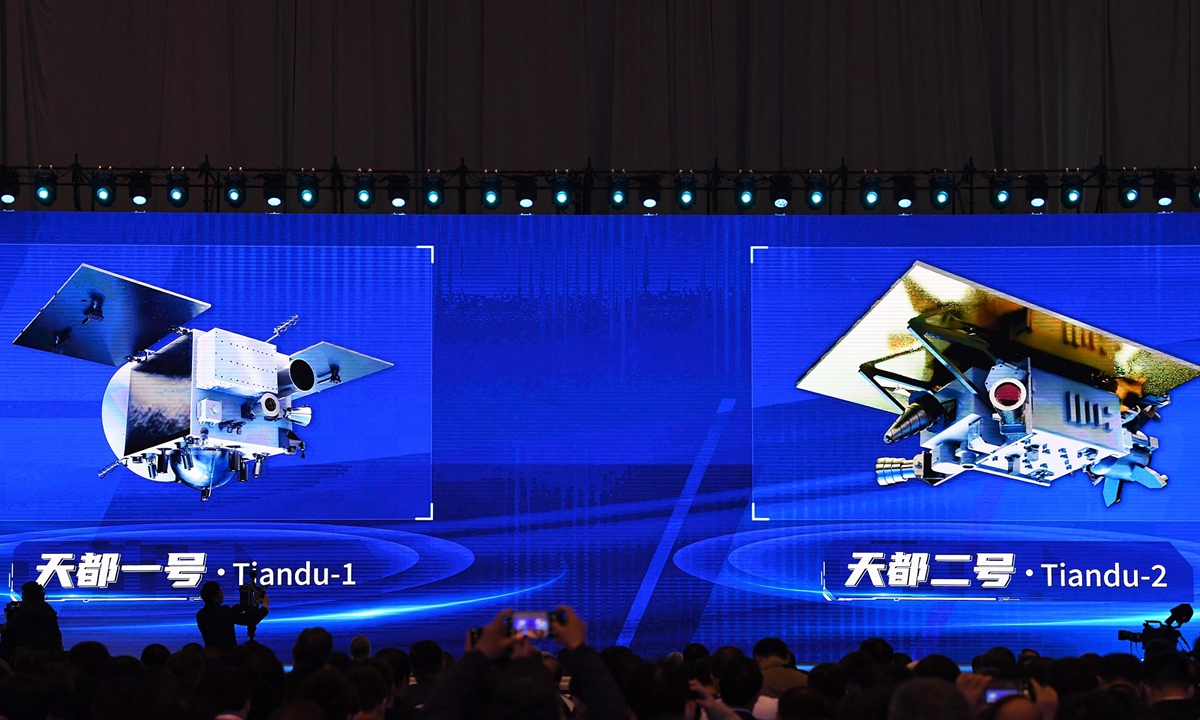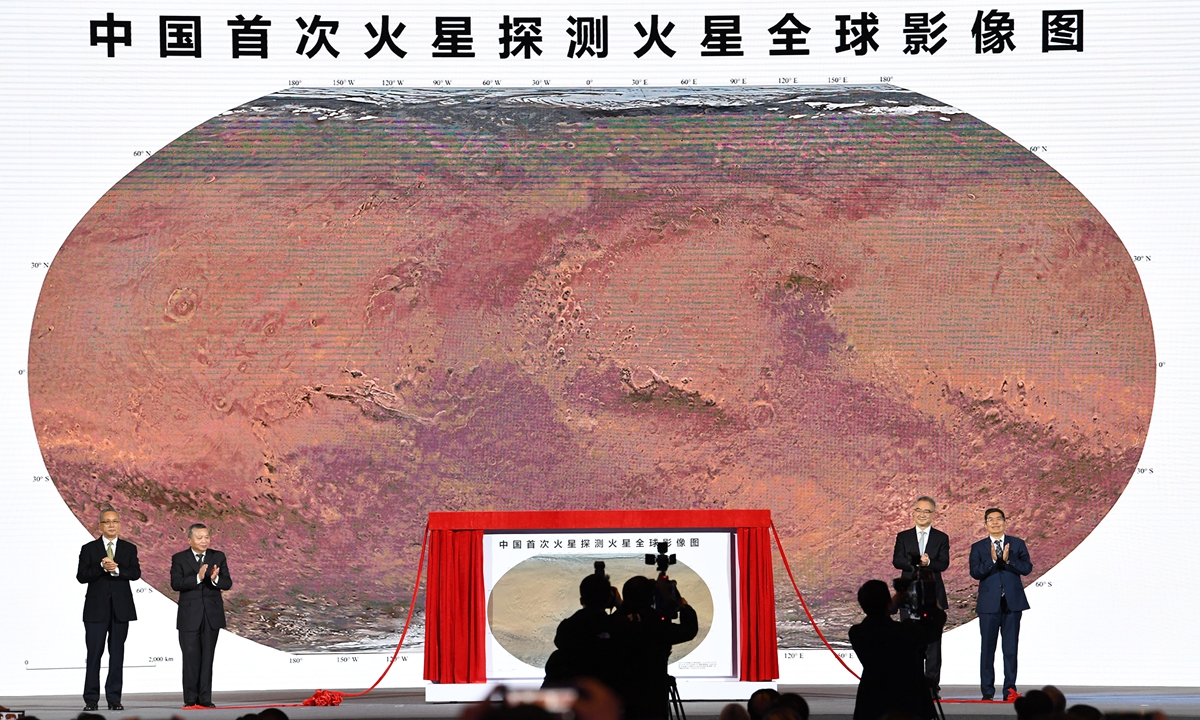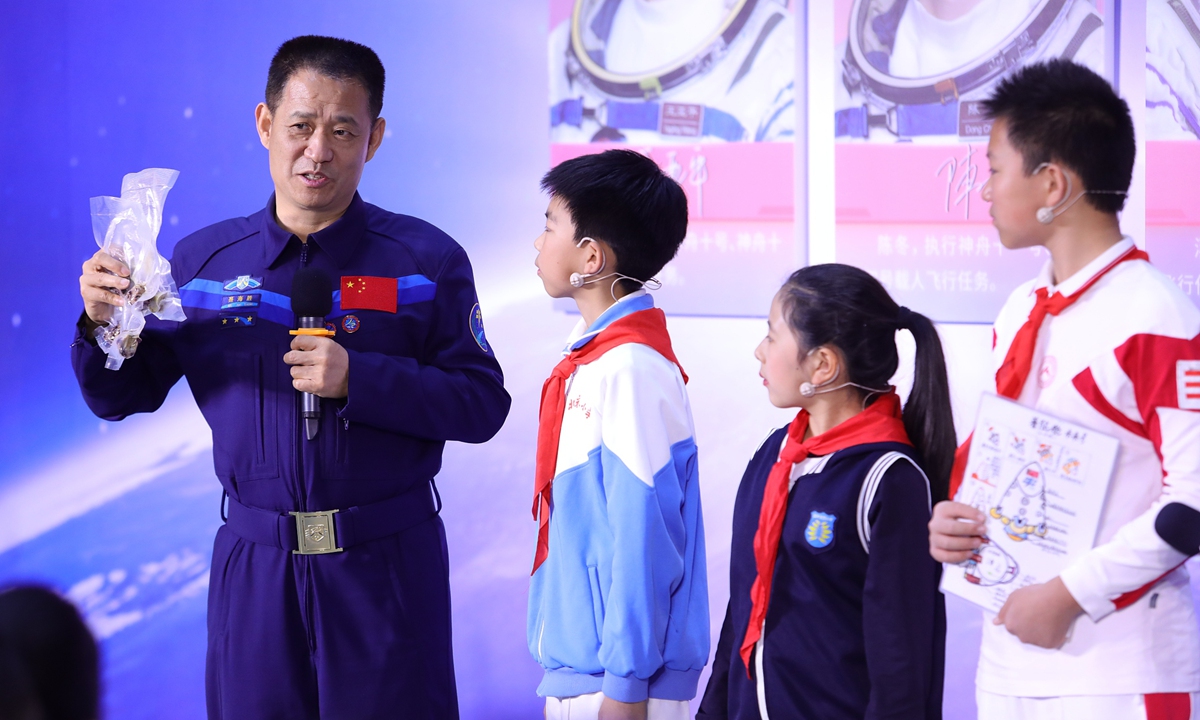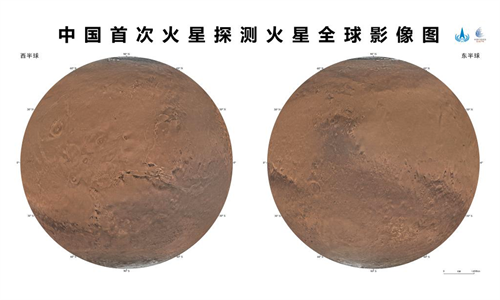
China marks its eighth national space day on Monday, with a grand opening ceremony held in Hefei, capital of East China's Anhui Province on April 24, 2023. Photo: VCG
China marked its eighth Space Day on Monday, with a grand opening ceremony held in Hefei, capital of East China's Anhui Province. At the event which also kick-started the annual China Space Conference, China unveiled significant accomplishments in the aerospace domain in the past year and outlined exciting plans for future exploration, winning applauds from attendees from all over the world.
The opening ceremony of the Space Day of China had quite a friendly atmosphere from the very beginning, with distinguished guests from space agencies of countries including France, Argentina and Thailand as well as international organizations like the European Space Agency (ESA) and the United Nations, sending congratulatory messages to the China National Space Administration (CNSA) as the Chinese national space agency celebrated the 30th anniversary of its establishment.
China released the country's first-ever global color image map of Mars at the Monday event. The map was produced by processing a mosaic with 14,747 images obtained by the Moderate Resolution Imagining Camera onboard the country's Tianwen-1 orbiter, the Global Times learned from the CNSA.

China releases its first-ever global color image map of Mars using images obtained from its first Mars exploration mission on April 24, 2023 at the annual China Space Conference held in Hefei, East China's Anhui Province, providing an improved quality base map for scientific and exploration tasks. Photo: VCG
Tianwen-1, successfully launched on July 23, 2020, was China's first interplanetary exploration. After a flight of 202 days, Tianwen-1 reached Mars' orbit and on May 15, 2021, the Zhurong rover landed on the red planet. So far, the rover has trekked 1,921 meters on the Mars surface in 385 Martian days - long past its designed 90 days service life.
According to the CNSA on Monday, 13 pieces of payload onboard the Tianwen-1 mission have obtained 1,800 gigabytes of raw scientific data, formulating standard data products, through which scientists and research teams have made several discoveries.
China has also been engaged with international partners in sharing fruits of its landmark Chang'e-5 lunar sample returning mission.
According to the CNSA, China gifted 1.5 grams of Chang'e-5 lunar samples to France during French President Emmanuel Macron's visit to China in early April and the same amount of the precious samples to Russia during Russian President Vladmir Putin's China visit on February 4, 2022.
So far, scientists and researchers from Australia, Russia, France, the US, the UK and Sweden have joined in the study of the lunar samples retrieved by the Chinese mission, according to the CNSA.
"The international sharing [of these samples] and joining forces to study these samples is a major event in the global scientific circle, and it is also a crucial way for us to understand the formation and evolution of the moon. China has carried out aerospace exchange and cooperation with other countries based on the principle of peaceful use, equality and mutual benefit, jointly pushing forward the building of a shared future of mankind in the outer space," said the CNSA in a statement it provided to the Global Times on Monday.
With the completion of the in-orbit assembly and building of China Space Station in 2022, Zhou Jianping, chief architect of China's manned space program, was recognized with the Qian Xuesen Highest Award at the Monday event. Qian (1911-2009) was a Chinese aerospace engineer and cyberneticist who made significant contributions to the field of aerodynamics and established engineering cybernetics.
Rapid pace
Former US astronaut Donald Thomas told the Global Times during an exclusive interview on Monday on the sidelines of the China Space Conference that he had been closely following China's space program for the last 10 years, starting with the Chang'e-2 and the Yutu Rover. What really caught his attention was two years ago when the Chang'e-5 brought the lunar soil back to the Earth.
"It was an amazing accomplishment to land on the moon, to drill down to collect samples, to take off from the moon and get the samples back to the Earth. China made it look easy, but we all know it is very hard," Thomas said. "So I was just in awe that they accomplished that in first try with no problems along the way."
The development of manned space program has been so rapid that Thomas was really impressed how quick the building of the Tiangong space station was. "They [Chinese taikonauts] live up there for six months at a time already. And it took the US many years to get to that point. So I've just been impressed with the rapid pace of your space program," he said.
Thomas also said China and the US are not rivals in space, noting there is no space race between the US and China. "We're all learning about the planet Mars and about the moon, about the universe, our solar system. And I think it's shared knowledge for everybody back on the Earth. So I don't think I would use the word like 'competition' to describe the relationship."
Thomas is hopeful that China and the US and all countries could cooperate in space exploration. It has been learned in the last 50 years, in the example of the Soviet Union and the US, that cooperation in space is a much better path than competition, Thomas said. He believes the friendship between the astronauts from different countries can be a great model from which people can draw inspiration down on the Earth.

China marks its eighth national space day on Monday, with a grand opening ceremony held in Hefei, capital of East China's Anhui Province on April 24, 2023. Photo: VCG
Good news for developing countries
Mazlan Othman, former director of the UN Office for Outer Space Affairs, who attended the Monday event, told the Global Times that China has made it very clear and has held its hand out to cooperate with developing countries, especially at the space station.
"When I was at the UN Office for Outer Space Affairs, we had a program called Human Space Technology Initiative. Under that program, China led the way in discussing how we can bring experiments from developing countries to the China Space Station, as well as possibly an astronaut chosen at the international level to bring this particular person, not from ESA or NASA or Roscosmos, but from the developing countries, to go to China Space Station," said the former UN official.
The reason why China stands above everyone else is because the other countries are focused on themselves. But China is focused on the developing countries. That was why there is very special place in Othman's heart for the China space program.
When asked to comment on whether astronauts from the ESA would join missions to the China Space Station, Karl Bergquist, administrator of external relations department with the ESA, told the Global Times that the matter hadn't been discussed yet. But who knows what will happen in the future if there will be discussions on such things, he said.
"We have many collaborations between Europe and China on the scientific use of the China Space station. This is also something which is important to highlight," the ESA official said.
The ESA has very good cooperation with China, including building a satellite with the Chinese Academy of Sciences for the study of the magnetosphere and it also provides instruments and hardware to the Einstein probe in a Chinese mission.
"We have a big corporation with the US yet we believe we can cooperate with both China and the US," Bergquist said.


